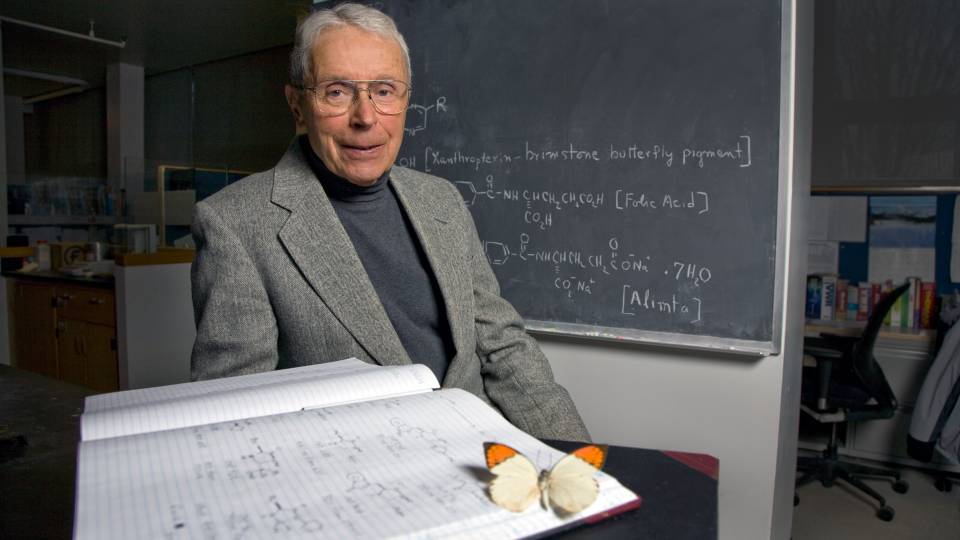Princeton University awarded honorary degrees during Commencement exercises Tuesday, June 1, to five distinguished individuals for their contributions to the humanities, law, medical and scientific research and human rights.
Princeton President Shirley M. Tilghman awarded degrees to Drew Gilpin Faust, a historian and the president of Harvard University; Ruth Bader Ginsburg, a U.S. Supreme Court justice and trailblazer for women's rights; Olufunmilayo Olopade, a medical researcher who focuses on cancer risk assessment; Albie Sachs, a champion of human rights in South Africa; and Edward Taylor, Princeton's A. Barton Hepburn Professor of Organic Chemistry Emeritus.
The following is biographical information on the recipients and the official citations.
Drew Gilpin Faust, Doctor of Laws
Drew Gilpin Faust has served as president of Harvard University since 2007. A historian of the Civil War and the American South who grew up in rural Virginia, Faust is also the Lincoln Professor of History at Harvard. Previously, she was the founding dean of Harvard's Radcliffe Institute for Advanced Study for six years. Before Radcliffe, Faust was the Annenberg Professor of History and director of the Women's Studies Program at the University of Pennsylvania, where she served on the faculty for 25 years. In selecting Faust as its 28th president, Harvard appointed its first leader without a Harvard degree since the university appointed its third president in 1654.
Faust is the author of six books, including "This Republic of Suffering: Death and the American Civil War," which was nominated for a National Book Award in 2008, and "Mothers of Invention: Women of the Slaveholding South in the American Civil War," which won the Francis Parkman Prize for the best book in American history in 1997. She was elected to the American Philosophical Society in 2004, the American Academy of Arts and Sciences in 1994 and the Society of American Historians in 1993.
What brings the president of our sister institution on the Charles to this house of Orange/Nassau? Some Faustian pact with the devil? No! She is here to receive our praise as an award-winning historian of the Civil War and the antebellum South, teacher and leader of our nation's oldest center of higher learning. How extraordinary is this woman? In selecting her, Harvard chose a president without a Harvard degree -- for the first time since 1654. A visionary leader, she champions excellence and opportunity, and at a time when the very purposes of a university are questioned, she brings her powerful intellect, insight and integrity to bear on the challenges ahead. Daughter of a Princetonian, she now becomes a daughter of Princeton. In accordance with Princeton's motto, under God's power may she flourish.
Ruth Bader Ginsburg, Doctor of Laws
U.S. Supreme Court Justice Ruth Bader Ginsburg, a native of Brooklyn, N.Y., has had a trailblazing career in the law and is especially known for advancing women's rights. Ginsburg was nominated to the Supreme Court by President Bill Clinton in 1993, and is the second woman to serve on the court.
Prior to her appointment, Ginsburg was a judge of the U.S. Court of Appeals for the District of Columbia Circuit for 13 years. In 1971 she was instrumental in launching the Women's Rights Project of the American Civil Liberties Union (ACLU) and served as general counsel for the ACLU, as well as on its national board of directors. While a professor at Rutgers University Law School from 1963 to 1972, she battled for maternity leave rights for schoolteachers in New Jersey. In 1972 Ginsburg became the first woman hired with tenure at Columbia University School of Law.
Denied deserved recognition by a discriminatory profession when she graduated at the top of her law school class, she has dedicated her life to vindicating the Constitution's promise of equality under law as a distinguished law professor, a respected Supreme Court litigator and a trailblazing advocate for women's rights. Through brilliant strategy and rigorous argument, she persuaded the Supreme Court to recognize a constitutional right to be free from sex discrimination. Her triumphs earned her a seat on the bench and eventually on this nation's highest court, where her jurisprudence is a beacon of freedom that illuminates the continuing power of America's constitutional ideals.
Olufunmilayo Olopade, Doctor of Science
Olufunmilayo Olopade, a clinician and researcher, has dedicated her career to the study of breast cancer and cancer risk assessment. At the University of Chicago, she is the Walter L. Palmer Distinguished Service Professor in Medicine and Human Genetics, director of the Center for Clinical Cancer Genetics and director of the hematology and oncology fellowship program. She also leads the University of Chicago Medical Center's Cancer Risk Clinic. Olopade's research has revealed that an aggressive variation of breast cancer occurs more frequently and at an earlier age in women of African ancestry than in Caucasian women, and she has gained insights in understanding the disease and its resistance to certain drugs.
In her clinical work, Olopade also is an expert on cancer risk and prevention, and on individualized treatment based on risk factors and quality of life. She is working with doctors in her native Nigeria, and with government officials and drug companies across Africa, to improve education and treatment.
Witness to hundreds of parishioners who came to her minister father daily for help in her native Nigeria, she decided to become a doctor who would minister especially to those with breast cancer. Regarding her patients as teachers, she involves their families in the quest for life-saving answers. Using molecular findings and innovative clinical practices, she has discovered lethal links between genetics and risk factors. Her battle to improve early detection and treatment extends from America to Africa, from the classroom to the laboratory, focused always on the needs of the individual -- on giving them the gift of time, and, in time, finding a cure.
Albie Sachs, Doctor of Laws
A chief architect of South Africa's post-apartheid constitution, Albie Sachs is known for his lifelong work in defending people against oppression. After South Africa's first democratic election in 1994, he was appointed by President Nelson Mandela to serve as a judge on the country's newly established constitutional court, from which he retired in 2009.
Working as a lawyer during apartheid, Sachs defended people charged under racist statutes and repressive security laws, many of whom faced a death sentence. Sachs himself was seized by police and placed in solitary confinement. In 1966 he went into exile and worked for 11 years studying and teaching law in England, and then for another 11 years working as a law professor and legal researcher in Mozambique. It was in Mozambique in 1988 that he lost an arm and sight in one eye to a bomb placed in his car by South African security agents. In the early 1990s, Sachs returned to his home country and participated in negotiations leading to South Africa becoming a constitutional democracy. A decade later, he helped write a new South African law allowing for same-sex marriage. Sachs is the author of five books that describe his life experiences and examine larger issues of social justice, including "Soft Vengeance of a Freedom Fighter."
Broken in body but never in spirit, he endured 30 years of persecution, violence and exile before leading South Africa in the creation of a new constitutional framework for securing freedom and justice. Forged in a crucible of unspeakable pain, his lifelong commitment to social justice and equality before the law springs from an unshakeable faith in humanity that patiently embraces the peaceful competition of dissenting voices so that freedom and enlightenment may prevail over oppression and ignorance. Today the courageous writings and rulings of this visionary jurist continue to heal and illuminate a once divided nation. His pivotal role has helped bring his country into the community of responsible nations, with a constitution that recognizes the dignity of all of its citizens.
Edward Taylor, Doctor of Science
Edward Taylor joined the Princeton faculty in 1954 and transferred to emeritus status in 1997. He has written more than 450 scientific papers, has served as editor of longstanding science journals and holds 52 U.S. patents. Taylor is the inventor of the anti-cancer drug, Alimta, which he developed in collaboration with Eli Lilly and Co. scientists to treat malignant pleural mesothelioma, a lung cancer often caused by exposure to asbestos. Approved by the U.S. Food and Drug Administration in 2004, the drug has since received additional approvals for treatment of other tumors.
Taylor has received numerous honors and awards. He has been inducted into the New Jersey Inventors Hall of Fame and was chosen to receive the 2010 Alfred Burger Award in Medicinal Chemistry from the American Chemical Society (ACS). Taylor's previous honors include the ACS's Heroes of Chemistry Award, the International Society of Heterocyclic Chemistry Senior Award in Heterocyclic Chemistry, and the Research and Development Council of New Jersey's Alva Edison Patent Award for Invention.
Fascination with the iridescent wing of the butterfly led him on a journey that resulted in the development of molecules that improve the lives of thousands. In the chaotic world of drug design he brings rationality, designing selective warriors against cancerous tumors that avoid indiscriminate destruction of healthy tissue. As a charismatic teacher, influential adviser, accomplished researcher and respected consultant, he has demonstrated not only a passion for discovery, but a determination to translate discovery into treatment. His four-plus decades at Princeton leave a lasting legacy for his students and colleagues, his University and all throughout the world who benefit from the fruits of his curiosity.

